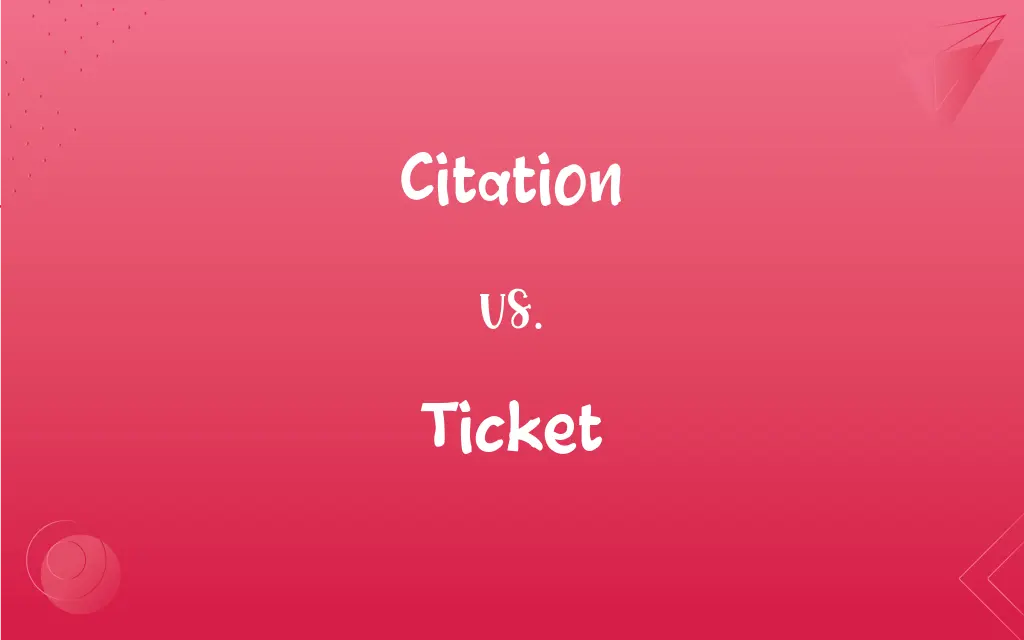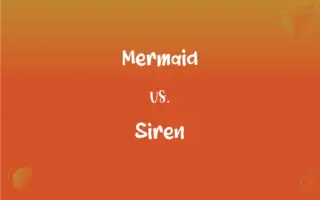Citation vs. Ticket: What's the Difference?
Edited by Janet White || By Harlon Moss || Updated on October 10, 2023
A citation refers to a formal reference or quotation, while a ticket often denotes a legal summons or a pass for entry.

Key Differences
Citation, in academic and legal contexts, represents a note or reference indicating the source of a statement. In contrast, a ticket, particularly in the transportation and event context, signifies a token validating entry or participation. Both words, citation and ticket, have commonalities in that they provide a form of proof or validation, either of an authoritative source or of permission and entitlement.
Citation and ticket bear distinct implications when we perceive them through the lens of legal terminology. A citation typically is a note of violation, a formalized notice provided by law enforcement to notify an individual of their contravention of specific regulations. Meanwhile, a ticket, even though closely related and often used interchangeably with citation in some regions, might be more frequently associated with practical use like permitting access to events, travel, or other amenities.
In various instances, citation and ticket can be construed in different manners due to regional dialects and local semantic differences. Citation, while maintaining its legal and academic usage, can also pertain to mentioning or acknowledging something noteworthy. On the other hand, a ticket generally remains more tangible, acting as a piece of documentation or digital validation granting entitlement or recognizing one’s purchase or privilege.
Often, citation may require additional follow-up, such as responding to a legal summons or adhering to an outlined consequence. The ticket, while it can also necessitate an action like payment of a fine when referring to a traffic violation, may also serve as a mere pass or entitlement without additional obligations, such as attending an event. Citation and ticket, thus, navigate through the domains of acknowledgment, permission, and occasionally, violation, reflecting varied usage based on context.
Comparison Chart
Primary Context
Often legal or academic
Commonly practical (e.g., events, travel)
ADVERTISEMENT
General Implication
Reference or violation note
Access pass or violation note
Obligation
Might require a response or action
May or may not require action
Physicality
Can be tangible or intangible
Usually tangible or digital
Universality
Usage may vary globally
Common understanding globally
Citation and Ticket Definitions
Citation
In legal terms, a citation may refer to a notice of a violation.
The officer issued a citation for parking in a no-parking zone.
ADVERTISEMENT
Ticket
A ticket can represent a means to achieve something.
His innovative invention was a ticket to fame and success.
Citation
A citation can represent a summon to appear in court.
The individual was distressed after receiving a citation in the mail.
Ticket
A ticket is a piece of paper or digital document that provides access to an event or venue.
She bought a ticket for the concert next week.
Citation
A citation also implies a formal acknowledgment of achievement.
The soldier received a citation for bravery in the field.
Ticket
A ticket can refer to a legal notice of a traffic violation.
The driver was frustrated upon receiving a speeding ticket.
Citation
A citation is a reference to a source of information.
The student included a citation for every fact in his essay.
Ticket
A ticket may imply a political slate of candidates.
The party announced their ticket for the upcoming election.
Citation
A citation may also refer to a mention of notable conduct.
The scientist’s citation in the research paper acknowledged her groundbreaking work.
Ticket
A ticket might refer to a problem report in IT and customer support contexts.
The user submitted a ticket to address the software bug.
Ticket
A paper slip or card indicating that its holder has paid for or is entitled to a specified service, right, or consideration
A theater ticket.
An airline ticket.
FAQs
Can a citation be issued without immediate notification to the individual?
Yes, some citations, like those for certain traffic or legal violations, might be mailed to the individual instead of being issued in person.
How does a ticket function in the context of transportation?
A ticket in transportation serves as a pass, granting permission to travel on a vehicle, such as a bus, train, or plane.
Is a ticket always a physical item?
No, a ticket can be physical or digital, such as e-tickets used for events and airlines.
How does one manage citations in long academic works?
For managing citations in long academic works, software like EndNote, Zotero, or Mendeley are often used to organize and format them.
Can citations impact one's driving record?
Yes, certain citations, especially for traffic violations, can impact your driving record and possibly your insurance rates.
What is meant by 'ticket scalping'?
'Ticket scalping' refers to reselling tickets, often for popular events, at a price higher than the original cost, sometimes in violation of legal regulations.
Is a citation always a negative implication in a legal scenario?
Often, yes. In legal contexts, a citation usually denotes a violation or summons, which is typically undesirable.
What is a 'split ticket' in a political context?
A 'split ticket' refers to a ballot where the voter has chosen candidates from different political parties for various positions.
What is a citation in an academic context?
A citation in academia refers to crediting original sources, providing a reference that details the origin of the information or idea.
How are ticket prices generally determined?
Ticket prices can be determined by various factors, including demand, seat location, event type, and purchasing platform.
Are there standardized formats for academic citations?
Yes, there are several standardized formats, such as APA, MLA, and Chicago, each with specific rules for citation crafting.
Can a citation be appealed or contested in court?
Yes, citations, particularly legal or traffic ones, can often be appealed or contested through a designated legal process.
How can a ticket be verified for its authenticity?
Tickets can often be verified through unique codes, barcodes, QR codes, or by checking against the issuer’s database.
In what scenario is a ticket viewed in a positive light?
When associated with events, entertainment, or lottery, a ticket is viewed positively as it provides access or opportunity to win.
Is it mandatory to include citations in all academic works?
Generally, yes. Citations are crucial in academic works to credit original sources and avoid plagiarism.
Can a ticket be transferred to another individual?
Depending on the issuer's policy, some tickets, especially for events or travel, might be non-transferable, while others may allow it.
What is the significance of citation indices in research?
Citation indices help gauge the impact and relevance of research by tracking how often a work is cited in other scholarly works.
How does a 'season ticket' function?
A 'season ticket' typically provides access to a series of events or a duration of service, like attending all home games of a sports team.
Can a citation result in legal consequences if ignored?
Yes, ignoring a legal citation, especially for violations, can result in additional fines, penalties, or further legal action.
What does 'ticket' mean in a technical or IT context?
In IT, a ticket often refers to a recorded issue or problem that needs resolution, often logged in a helpdesk or issue tracking system.
About Author
Written by
Harlon MossHarlon is a seasoned quality moderator and accomplished content writer for Difference Wiki. An alumnus of the prestigious University of California, he earned his degree in Computer Science. Leveraging his academic background, Harlon brings a meticulous and informed perspective to his work, ensuring content accuracy and excellence.
Edited by
Janet WhiteJanet White has been an esteemed writer and blogger for Difference Wiki. Holding a Master's degree in Science and Medical Journalism from the prestigious Boston University, she has consistently demonstrated her expertise and passion for her field. When she's not immersed in her work, Janet relishes her time exercising, delving into a good book, and cherishing moments with friends and family.






































































